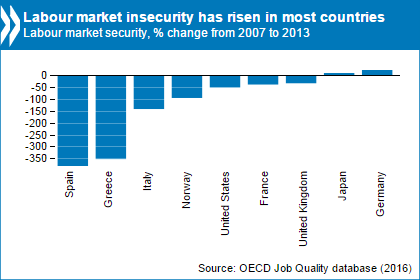G20 › Topics › Employment-and-social-policy › New data show importance of quality as well as quantity of jobs and how both evolved during crisis
New data show importance of quality as well as quantity of jobs and how both evolved during crisis
09/02/2016 - Good pay, labour market security and a decent working environment can go hand in hand with high employment, according to new OECD findings on the quality of jobs in 45 countries.
The measures released today in a new database on job quality (key findings) look at the individual experience of people at work. Rather than concentrating on the drivers of job quality such as compliance with standards and regulations, the OECD focuses on the outcomes for workers in three broad areas that are most important for their well-being:
- Earnings quality. How does employment contribute to material living conditions? How are earnings distributed across the workforce?
- Labour market security. What is the level of risk of becoming and staying unemployed? What are the economic consequences for workers of being laid off?
- The quality of the working environment. Having a job is not just about money. What is the nature and content of the work? How much pressure does it involve? Working-time arrangements, workplace relationships, opportunities for training and work-life balance are also important factors.
The database shows that job quality is the highest in Australia, Austria, Denmark, Finland, Germany, Luxemburg, Norway, and Switzerland. These countries are performing relatively well along at least two of the three dimensions of job quality. However, relatively low job quality is found in Estonia, Greece, Hungary, Italy, Poland, Portugal, the Slovak Republic, Spain and Turkey.
|
The data also reveal big differences across groups of workers. Youths and the unskilled not only tend to have the worst performance in terms of employment but they also have lower earnings and considerably higher labour market insecurity and higher job strain (especially the low skilled). Women suffer from substantially lower employment rates than men and face a large pay gap. At the same time, they are less likely than men to experience job strain.
The data also reveal how job quality has changed over the past decade. The crisis not only heavily affected the number of jobs available but also their quality. Earnings quality, once taking into account that the jobs destroyed during the crisis were predominantly low-paid, decreased in two thirds of the OECD countries -- especially in Greece and the United Kingdom. Labour market security worsened in most OECD countries, particularly in Spain and Greece. Quality of the working environment changed differently across the OECD. While some countries experienced a worsening in working conditions as a result of the crisis, in others workers who managed to keep their job saw their working conditions improve. Overall, changes were limited. |
|
A comprehensive assessment of how the crisis affected job quality requires all three dimensions need to be considered together. Germany, for instance, not only experienced an increase in employment rates, but also a general improvement in all aspects of job quality. Greece, however, experienced both a sharp rise in unemployment and a fall in earnings quality and labour market security (while the incidence of job strain remained stable). In the United Kingdom, where employment is almost back to pre-crisis levels, earnings quality decreased over the period while labour market security only fell slightly. The quality of the working environment was unaffected.
In other OECD countries, the effects of the crisis were more mixed. In Portugal, earnings quality stagnated and labour market security fell considerably, while quality of the working environment improved for those people still employed. In Sweden earnings quality improved but labour market security decreased and the quality of the working environment worsened.
The central challenge of improving job quality was a key priority of the Turkish G20 Presidency last year, as well for the broader G20 membership, and led to the endorsement of a G20 job quality framework developed by the OECD, in collaboration with the International Labour Organisation (ILO). The G20 Leaders tasked the OECD with supporting the Group, going forward, in reviewing progress and identifying good practices in this critical area for all G20 economies.
The OECD Secretary General, Angel Gurria said: “Job quality is not only important to workers’ well-being, but also to the overall productivity of a firm. This is now understood at the highest political levels. The leaders of the G20 countries agreed last year not just to prioritise creating more jobs, but to ensure they are quality jobs. And just a few weeks ago, the Labour Ministers gave a strong mandate to the OECD to design policies to improve all aspects of job quality – job security, earnings quality and the quality of our working environment. This will be a major pillar of the revised Jobs Strategy the OECD is currently working on”.
The full Quality Jobs database can be found here: http://stats.oecd.org/Index.aspx?DataSetCode=JOBQ
Further information and insights into the OECD Quality Jobs Database is available here or from the OECD’s Media Division (+33 1 45 24 9700).
Working with over 100 countries, the OECD is a global policy forum that promotes policies to improve the economic and social well-being of people around the world.
Related Documents



Follow us
E-mail Alerts Blogs